小学英语时态及句型转换(打印)
- 格式:doc
- 大小:42.00 KB
- 文档页数:2
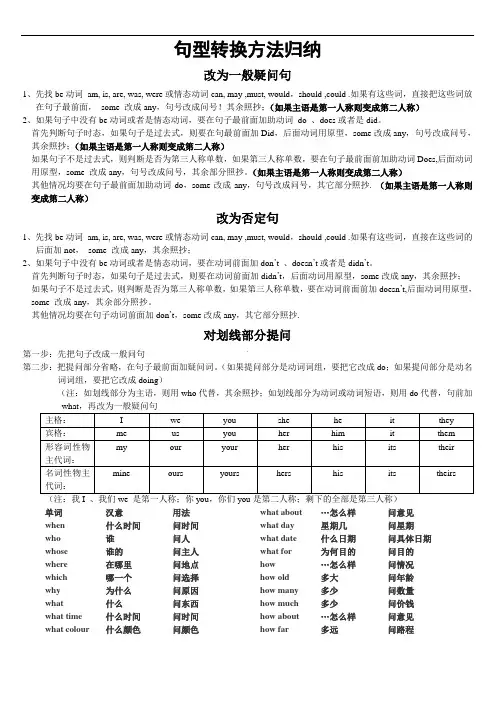
句型转换方法归纳改为一般疑问句1、先找be动词am, is, are, was, were或情态动词can, may ,must, would,should ,could .如果有这些词,直接把这些词放在句子最前面,some 改成any,句号改成问号!其余照抄;(如果主语是第一人称则变成第二人称)2、如果句子中没有be动词或者是情态动词,要在句子最前面加助动词do 、does或者是did。
首先判断句子时态,如果句子是过去式,则要在句最前面加Did,后面动词用原型,some改成any,句号改成问号,其余照抄;(如果主语是第一人称则变成第二人称)如果句子不是过去式,则判断是否为第三人称单数,如果第三人称单数,要在句子最前面前加助动词Does,后面动词用原型,some 改成any,句号改成问号,其余部分照抄。
(如果主语是第一人称则变成第二人称)其他情况均要在句子最前面加助动词do,some改成any,句号改成问号,其它部分照抄.(如果主语是第一人称则变成第二人称)改为否定句1、先找be动词am, is, are, was, were或情态动词can, may ,must, would,should ,could .如果有这些词,直接在这些词的后面加not,some 改成any,其余照抄;2、如果句子中没有be动词或者是情态动词,要在动词前面加don’t 、doesn’t或者是didn’t。
首先判断句子时态,如果句子是过去式,则要在动词前面加didn’t,后面动词用原型,some改成any,其余照抄;如果句子不是过去式,则判断是否为第三人称单数,如果第三人称单数,要在动词前面前加doesn’t,后面动词用原型,some 改成any,其余部分照抄。
其他情况均要在句子动词前面加don’t,some改成any,其它部分照抄.对划线部分提问第一步:先把句子改成一般问句第二步:把提问部分省略,在句子最前面加疑问词。
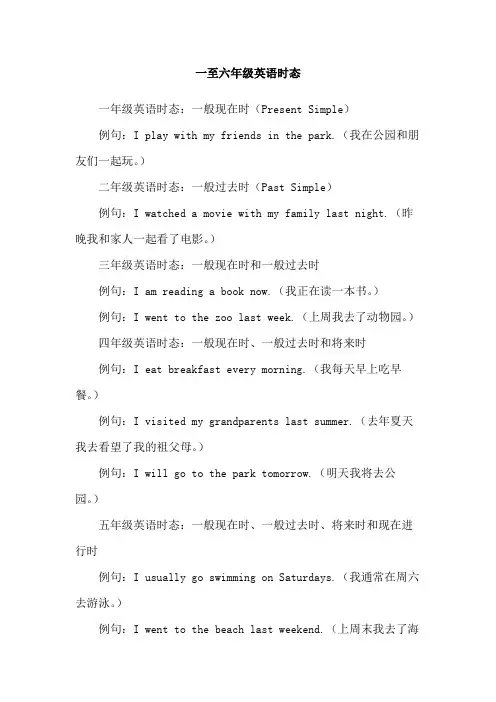
一至六年级英语时态一年级英语时态:一般现在时(Present Simple)例句:I play with my friends in the park.(我在公园和朋友们一起玩。
)二年级英语时态:一般过去时(Past Simple)例句:I watched a movie with my family last night.(昨晚我和家人一起看了电影。
)三年级英语时态:一般现在时和一般过去时例句:I am reading a book now.(我正在读一本书。
)例句:I went to the zoo last week.(上周我去了动物园。
)四年级英语时态:一般现在时、一般过去时和将来时例句:I eat breakfast every morning.(我每天早上吃早餐。
)例句:I visited my grandparents last summer.(去年夏天我去看望了我的祖父母。
)例句:I will go to the park tomorrow.(明天我将去公园。
)五年级英语时态:一般现在时、一般过去时、将来时和现在进行时例句:I usually go swimming on Saturdays.(我通常在周六去游泳。
)例句:I went to the beach last weekend.(上周末我去了海滩。
)例句:I will visit my friends next month.(下个月我将去拜访我的朋友。
)例句:I am studying for my test right now.(我现在正在为考试而学习。
)六年级英语时态:一般现在时、一般过去时、将来时、现在进行时和过去进行时例句:I usually practice the piano every day.(我通常每天练习钢琴。
)例句:I went to the museum last week.(上周我去了博物馆。
)例句:I will travel to Europe next year.(明年我将去欧洲旅行。
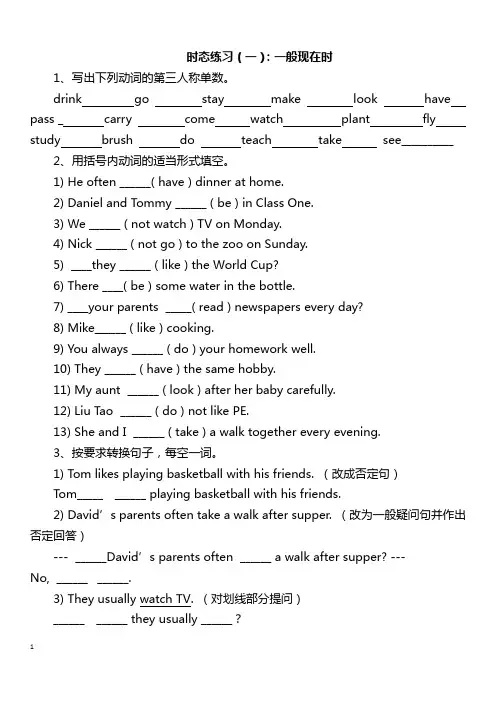
时态练习(一):一般现在时1、写出下列动词的第三人称单数。
drink go stay make look have pass _ carry come watch plant fly study brush do teach take see__________2、用括号内动词的适当形式填空。
1) He often ______( have ) dinner at home.2) Daniel and Tommy ______ ( be ) in Class One.3) We ______ ( not watch ) TV on Monday.4) Nick ______ ( not go ) to the zoo on Sunday.5) ____they ______ ( like ) the World Cup?6) There ____( be ) some water in the bottle.7) ____your parents _____( read ) newspapers every day?8) Mike______ ( like ) cooking.9) You always ______ ( do ) your homework well.10) They ______ ( have ) the same hobby.11) My aunt ______ ( look ) after her baby carefully.12) Liu Tao ______ ( do ) not like PE.13) She and I ______ ( take ) a walk together every evening.3、按要求转换句子,每空一词。
1) Tom likes playing basketball with his friends. (改成否定句)Tom_____ ______ playing basketball with his friends.2) David’s parents often take a walk after supper. (改为一般疑问句并作出否定回答)--- ______David’s parents often ______ a walk after supper? ---No, ______ ______.3) They usually watch TV. (对划线部分提问)______ ______ they usually ______?4)She is always a good student. (改为一般疑问句并作出肯定回答)5)--- ___ ______ always a ______ student? --- ______ , ______ ______ .6)5) Simon and Daniel like going skating. (改为否定句)7)Simon and Daniel ______ ______ going ______.6)Tom does his homework every day.(否定句)Tom_________ ______ his homework every day.7)Alice has got a new comic book as her birthday present.(改为一般疑问句并肯定回答)_________ Alice___________ a new comic book as her birthday presentYes, _______ _________.时态练习(二):一般将来时一、用所给动词的正确形式填空。
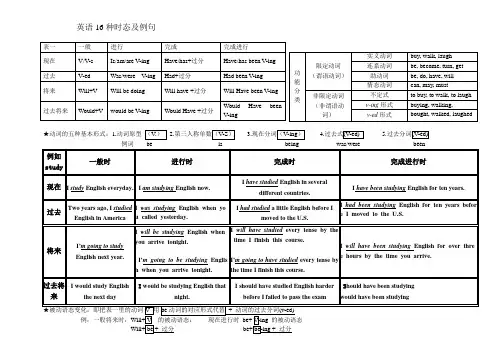
英语16种时态及例句★动词的五种基本形式:1.动词原型 (V .) 2.第三人称单数(V -S ) 3.现在分词(V -ing ) 4.过去式(V -ed) 5.过去分词(V -ed)例词 be is being was/were been例如study一般时 进行时 完成时完成进行时现在 I study English everyday. I am studying English now.I have studied English in severaldifferent countries.I have been studying English for ten years.过去Two years ago, I studied English in America I was studying English when you called yesterday.I had studied a little English before I moved to the U.S. I had been studying English for ten years before I moved to the U.S.将来I’m going to study English next year.I will be studying English when you arrive tonight.I’m going to be studying Englis h when you arrive tonight. I will have studied every tense by the time I finish this course.I’m going to have studied every tense by the time I finish this course.I will have been studying English for over three hours by the time you arrive. 过去将来 I would study English the next dayI would be studying English thatnight.I should have studied English harder before I failed to pass the examS hould have been studying would have been studying★被动语态变化:即把表一里的动词V 用be 动词的对应形式代替 + 动词的过去分词(v-ed) 例:一般将来时:Will+ V 的被动语态: 现在进行时 be+ V-ing 的被动语态 Will+ be + 过分 be+ be-ing + 过分功能分类 限定动词 (谓语动词) 实义动词buy, walk, laugh 连系动词 be, become, turn, get 助动词 be, do, have, will 情态动词 can, may, must非限定动词 (非谓语动词)不定式 to buy, to walk, to laugh v-ing 形式 buying, walking,v-ed 形式bought, walked, laughed表一 一般 进行完成完成进行现在 V/V -s Is/am/are V -ing Have/has+过分 Have/has been V -ing 过去 V -ed Was/were V -ing Had+过分 Had been V -ing 将来 Will+VWill be doingWill have +过分 Will Have been V -ing 过去将来Would+V would be V -ingWould Have +过分Would Have beenV -ing。
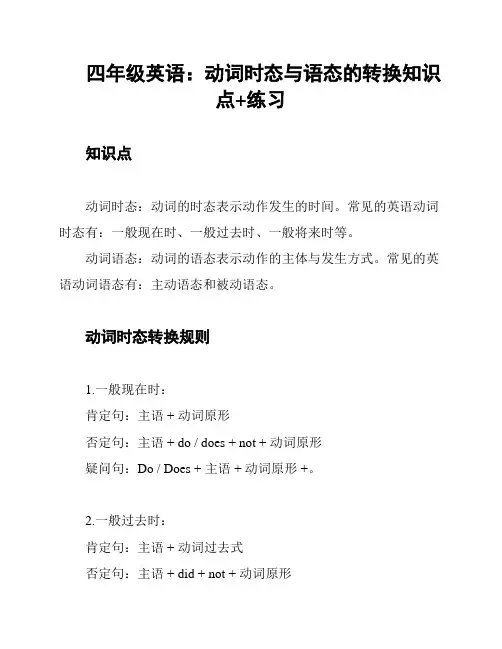
四年级英语:动词时态与语态的转换知识点+练习知识点动词时态:动词的时态表示动作发生的时间。
常见的英语动词时态有:一般现在时、一般过去时、一般将来时等。
动词语态:动词的语态表示动作的主体与发生方式。
常见的英语动词语态有:主动语态和被动语态。
动词时态转换规则1.一般现在时:肯定句:主语 + 动词原形否定句:主语 + do / does + not + 动词原形疑问句:Do / Does + 主语 + 动词原形 +。
2.一般过去时:肯定句:主语 + 动词过去式否定句:主语 + did + not + 动词原形疑问句:Did + 主语 + 动词原形 +。
3.一般将来时:肯定句:主语 + will + 动词原形否定句:主语 + will + not + 动词原形疑问句:Will + 主语 + 动词原形 +。
其他时态的转换规则可以参考相关教材。
动词语态转换规则1.主动语态:肯定句:主语 + 动词原形 / 动词时态否定句:主语 + do / does / did + not + 动词原形 / 动词时态疑问句:Do / Does / Did + 主语 + 动词原形 / 动词时态 +。
2.被动语态:肯定句:主语 + am / is / are / was / were + 过去分词否定句:主语 + am / is / are / was / were + not + 过去分词疑问句:Am / Is / Are / Was / Were + 主语 + 过去分词 +。
练题1.把下列句子改成一般现在时的否定句:I like apples。
-。
I do not like apples.___ to music。
-。
She does not listen to music.2.把下列句子改成一般过去时的疑问句:___。
-。
Did they play basketball?___。
-。
Did I watch a movie yesterday。
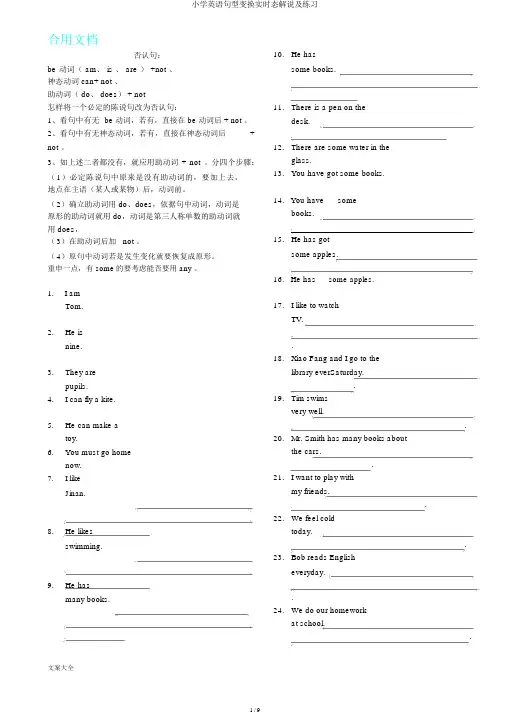
合用文档否认句:be 动词( am、 is 、 are ) +not 、神态动词 can+ not 、助动词( do、 does) + not怎样将一个必定的陈说句改为否认句:1、看句中有无be 动词,若有,直接在 be 动词后 + not 。
2、看句中有无神态动词,若有,直接在神态动词后+ not 。
3、如上述二者都没有,就应用助动词+ not 。
分四个步骤:(1)必定陈说句中原来是没有助动词的,要加上去,地点在主语(某人或某物)后,动词前。
(2)确立助动词用 do、does,依据句中动词,动词是原形的助动词就用 do,动词是第三人称单数的助动词就用 does,(3)在助动词后加 not 。
(4)原句中动词若是发生变化就要恢复成原形。
重申一点,有 some的要考虑能否要用 any 。
1. I amTom.______________________________2.He isnine.______________________________3.They arepupils.______________________________4.I can fly a kite.______________________________5.He can make atoy.______________________________6.You must go homenow.______________________________7.I likeJinan.8.He likesswimming.9.He hasmany books. 10.He hassome books.11.There is a pen on thedesk.12.There are some water in theglass.______________________________13.You have got some books.___________________________________14. You have somebooks.15.He has gotsome apples.16. He has some apples._________________________________________ 17.I like to watchTV.______ .18.Xiao Fang and I go to thelibrary everSaturday..19.Tim swimsvery well.___________.20.Mr. Smith has many books aboutthe cars..21.I want to play withmy friends..22.We feel coldtoday._____________ .23.Bob reads Englisheveryday..24.We do our homeworkat school..合用文档25.Mr. White hastwo houses..一般疑问句怎样将一个必定的陈说句改为一般疑问句:1、看句中有无 be 动词,若有,把 be 动词提到句首即可。
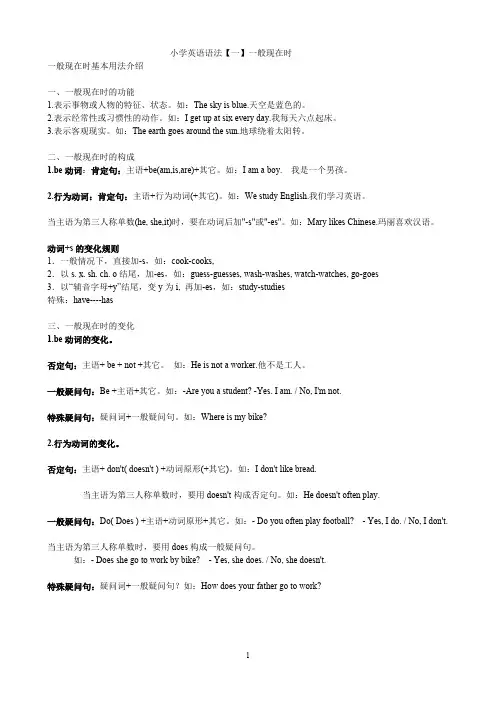
小学英语语法【一】一般现在时一般现在时基本用法介绍一、一般现在时的功能1.表示事物或人物的特征、状态。
如:The sky is blue.天空是蓝色的。
2.表示经常性或习惯性的动作。
如:I get up at six every day.我每天六点起床。
3.表示客观现实。
如:The earth goes around the sun.地球绕着太阳转。
二、一般现在时的构成1.be动词:肯定句:主语+be(am,is,are)+其它。
如:I am a boy. 我是一个男孩。
2.行为动词:肯定句:主语+行为动词(+其它)。
如:We study English.我们学习英语。
当主语为第三人称单数(he, she,it)时,要在动词后加"-s"或"-es"。
如:Mary likes Chinese.玛丽喜欢汉语。
动词+s的变化规则1.一般情况下,直接加-s,如:cook-cooks,2.以s. x. sh. ch. o结尾,加-es,如:guess-guesses, wash-washes, watch-watches, go-goes3.以“辅音字母+y”结尾,变y为i, 再加-es,如:study-studies特殊:have----has三、一般现在时的变化1.be动词的变化。
否定句:主语+ be + not +其它。
如:He is not a worker.他不是工人。
一般疑问句:Be +主语+其它。
如:-Are you a student? -Yes. I am. / No, I'm not.特殊疑问句:疑问词+一般疑问句。
如:Where is my bike?2.行为动词的变化。
否定句:主语+ don't( doesn't ) +动词原形(+其它)。
如:I don't like bread. 当主语为第三人称单数时,要用doesn't构成否定句。
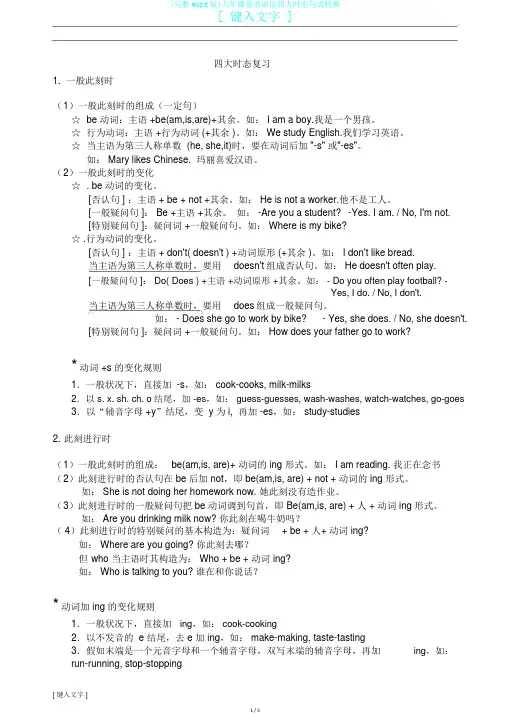
[ 键入文字 ]四大时态复习1.一般此刻时(1)一般此刻时的组成(一定句)☆be 动词:主语 +be(am,is,are)+其余。
如: I am a boy.我是一个男孩。
☆行为动词:主语 +行为动词 (+其余 )。
如: We study English.我们学习英语。
☆当主语为第三人称单数 (he, she,it)时,要在动词后加 "-s" 或"-es"。
如: Mary likes Chinese. 玛丽喜爱汉语。
(2)一般此刻时的变化☆. be 动词的变化。
[否认句 ] :主语 + be + not +其余。
如: He is not a worker.他不是工人。
[一般疑问句 ]: Be +主语 +其余。
如: -Are you a student? -Yes. I am. / No, I'm not.[特别疑问句 ]:疑问词 +一般疑问句。
如: Where is my bike?☆ .行为动词的变化。
[否认句 ] :主语 + don't( doesn't ) +动词原形 (+其余 )。
如: I don't like bread.当主语为第三人称单数时,要用doesn't组成否认句。
如: He doesn't often play.[一般疑问句 ]: Do( Does ) +主语 +动词原形 +其余。
如: - Do you often play football? -Yes, I do. / No, I don't.当主语为第三人称单数时,要用does组成一般疑问句。
如: - Does she go to work by bike?- Yes, she does. / No, she doesn't.[特别疑问句 ]:疑问词 +一般疑问句。
如: How does your father go to work?*动词 +s 的变化规则1.一般状况下,直接加 -s,如: cook-cooks, milk-milks2.以 s. x. sh. ch. o结尾,加 -es,如: guess-guesses, wash-washes, watch-watches, go-goes 3.以“辅音字母 +y”结尾,变 y 为 i, 再加 -es,如: study-studies2.此刻进行时(1)一般此刻时的组成: be(am,is, are)+ 动词的 ing 形式。
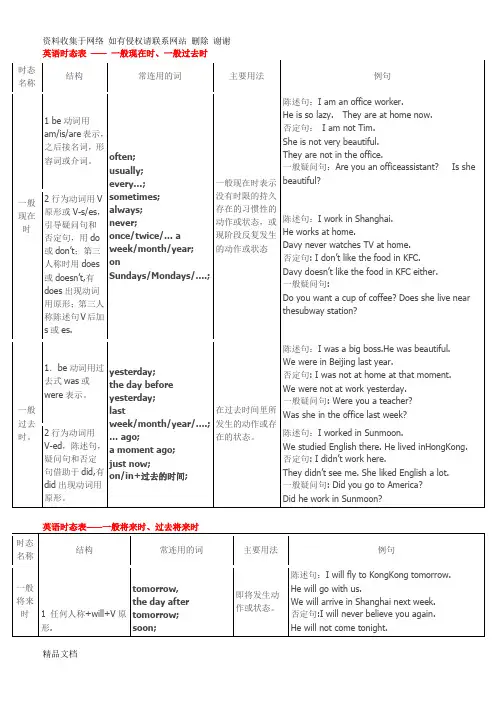
英语时态表 —— 一般现在时、一般过去时 时态 名称结构常连用的词主要用法例句一般现在时 1 be 动词用am/is/are 表示,之后接名词,形容词或介词。
often;usually;every…;sometimes;always;never;once/twice/… aweek/month/year;onSundays/Mondays/….; 一般现在时表示没有时限的持久存在的习惯性的动作或状态,或现阶段反复发生的动作或状态 陈述句:I am an office worker.He is so lazy. They are at home now. 否定句: I am not Tim.She is not very beautiful. They are not in the office.一般疑问句:Are you an officeassistant? Is shebeautiful?2行为动词用V原形或V-s/es ,引导疑问句和否定句,用do 或don’t ;第三人称时用does 或doesn’t,有does 出现动词用原形;第三人称陈述句V 后加s 或es.陈述句:I work in Shanghai. He works at home.Davy never watches TV at home. 否定句: I don’t like the food in KFC. Davy doesn’t like the food in KFC either. 一般疑问句:Do you want a cup of coffee? Does she live near thesubway station?一般过去时。
1.be 动词用过去式was 或 were 表示。
yesterday; the day before yesterday; last week/month/year/….; … ago;a moment ago;just now;on/in+过去的时间; 在过去时间里所发生的动作或存在的状态。
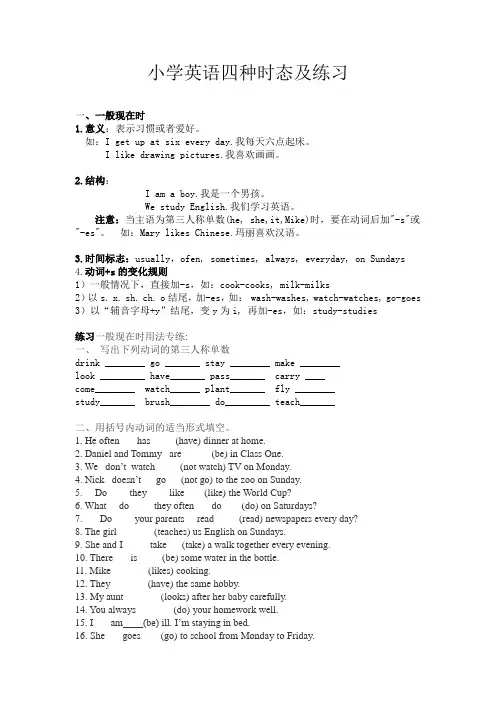
小学英语四种时态及练习一、一般现在时1.意义:表示习惯或者爱好。
如:I get up at six every day.我每天六点起床。
I like drawing pictures.我喜欢画画。
2.结构:I am a boy.我是一个男孩。
We study English.我们学习英语。
注意:当主语为第三人称单数(he, she,it,Mike)时,要在动词后加"-s"或"-es"。
如:Mary likes Chinese.玛丽喜欢汉语。
3.时间标志:usually,ofen, sometimes, always, everyday, on Sundays4.动词+s的变化规则1)一般情况下,直接加-s,如:cook-cooks, milk-milks2)以s. x. sh. ch. o结尾,加-es,如: wash-washes, watch-watches, go-goes 3)以“辅音字母+y”结尾,变y为i, 再加-es,如:study-studies练习一般现在时用法专练:一、写出下列动词的第三人称单数drink ________ go _______ stay ________ make ________look _________ have_______ pass_______ carry ____come________ watch______ plant_______ fly ________study_______ brush________ do_________ teach_______二、用括号内动词的适当形式填空。
1. He often ___has_____(have) dinner at home.2. Daniel and Tommy _are______(be) in Class One.3. We _don’t_watch_____(not watch) TV on Monday.4. Nick _doesn’t___go___(not go) to the zoo on Sunday.5. __Do____ they ____like____(like) the World Cup?6. What __do_____they often ___do____(do) on Saturdays?7. ___Do____ your parents __read_____(read) newspapers every day?8. The girl _______(teaches) us English on Sundays.9. She and I _____take___(take) a walk together every evening.10. There ___is_____(be) some water in the bottle.11. Mike _______(likes) cooking.12. They _______(have) the same hobby.13. My aunt _______(looks) after her baby carefully.14. You always _______(do) your homework well.15. I ___am____(be) ill. I’m staying in bed.16. She ___goes____(go) to school from Monday to Friday.17. Liu Tao ___does____(do) not like PE.18. The child often _______(watches) TV in the evening.19. Su Hai and Su Yang _______(have) eight lessons this term.20. -What day ____is___(be) it today?-It’s Saturday.三、按照要求改写句子1. Daniel watches TV every evening.(改为否定句)______________________________________________________2.I do my homework every day.(改为一般疑问句,作否定回答)____________________________________________________3. She likes milk.(改为一般疑问句,作肯定回答)_______________________________________________________4. Amy likes playing computer games. (改为一般疑问句,作否定回答)___________________________________________________5. We don’t go to school every morning.(改为肯定句)_______________________________________________________6. He doesn’t speak English very well.(改为肯定句)_____________________________________________________7. I like taking photos in the park.(对划线部分提问)_____________________________________________________8. John comes from Canada.(对划线部分提问)____________________________________________________9. She is always a good student?(改为一般疑问句,作否定回答)________________________________________________________10. Simon and Daniel like going skating.(改为否定句)___________________________________________________五、改错(划出错误的地方,将正确的写在横线上)1. Is your brother speak English? __________________2. Does he likes going fishing? _________________3. He likes play games after class. __________________4. Mr. Wu teachs us English. __________________5. She don’t do her homework on Sundays. _________________二、现在进行时1.意义:现在进行时表示现在正在进行或发生的动作。
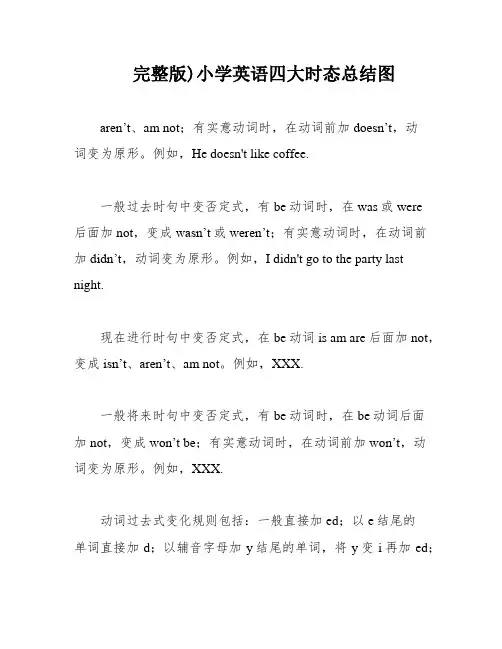
完整版)小学英语四大时态总结图aren’t、am not;有实意动词时,在动词前加doesn’t,动词变为原形。
例如,He doesn't like coffee.一般过去时句中变否定式,有be动词时,在was或were后面加not,变成wasn’t或weren’t;有实意动词时,在动词前加didn’t,动词变为原形。
例如,I didn't go to the party last night.现在进行时句中变否定式,在be动词is am are后面加not,变成isn’t、aren’t、am not。
例如,XXX.一般将来时句中变否定式,有be动词时,在be动词后面加not,变成won’t be;有实意动词时,在动词前加won’t,动词变为原形。
例如,XXX.动词过去式变化规则包括:一般直接加ed;以e结尾的单词直接加d;以辅音字母加y结尾的单词,将y变i再加ed;以辅元辅结尾的单词,双写最后一个辅音字母加ed;不规则变化。
例如,XXX.表示过去时间的词汇包括:yesterday、the day before yesterday、last + 时间(例如last year)、时间段+ago(例如one year ago)、in + 表示过去时间的词汇(例如in 1996)。
表示将来时间的词汇包括:now、tomorrow、the day after tomorrow、next + 时间段(例如next month)、in + 表示将来时间的词汇。
例如,We will go to the beach XXX.回答否定句时,需要注意人称及代词方面的变化。
有be 动词的句子中,将be动词提前,回答时用be动词回答;有实意动词时,需要助动词did的帮助,将did提前,回答时用did 回答。
最后,需要注意语态的变化。
例如,Active Voice句子:She ate the pizza。
时态的转换及用法归纳时态是语法中的一个重要概念,能够准确地表达动作或状态发生的时间。
在英语中,时态的转换及使用是学习者必须掌握的技能之一。
本文将对时态的转换和用法进行归纳总结,帮助读者更好地理解和运用不同时态。
一、一般现在时一般现在时表示目前的事实、常规或经常发生的动作。
主要的动词形式是原形动词,第三人称单数要在动词后加“s”。
一般现在时的肯定、否定和疑问句的构成如下:- 肯定句:主语 + 动词原形 + 其他- 否定句:主语 + do/does + not + 动词原形 + 其他- 疑问句:(特殊疑问词) + do/does + 主语 + 动词原形 + 其他例如:- I eat breakfast every morning.(我每天早上吃早餐。
)- He doesn't like coffee.(他不喜欢咖啡。
)- Do you play basketball?(你打篮球吗?)二、一般过去时一般过去时表示过去某个时间或时期发生的动作或状态。
最常用的动词形式是动词的过去式,疑问句和否定句使用助动词did。
一般过去时的肯定、否定和疑问句的构成如下:- 肯定句:主语 + 动词过去式 + 其他- 否定句:主语 + did not + 动词原形 + 其他- 疑问句:(特殊疑问词) + did + 主语 + 动词原形 + 其他例如:- She studied English last night.(昨晚她学习了英语。
)- We didn't go to the park.(我们没有去公园。
)- Did you eat lunch?(你吃午饭了吗?)三、一般将来时一般将来时表示将要发生的动作或状态,常用的句型是"will + 动词原形"。
一般将来时的构成如下:- 肯定句:主语 + will + 动词原形 + 其他- 否定句:主语 + will not + 动词原形 + 其他- 疑问句:(特殊疑问词) + will + 主语 + 动词原形 + 其他例如:- I will visit my grandmother tomorrow.(我明天会去看望我的奶奶。
四大时态1.一般过去时含义:表示过去某一时间所发生的动作或存在的状态。
谓语动词要用一般过去式。
结构:主语+动词过去式+其它。
标志词:yesterday, last+时间,...ago, in+过去的时间,例句:She went to the park last week.2.一般现在时含义:表示经常做的事情或发生的动作。
(事实,真理,名言警句常用一般现在时)结构:主语+动词原形或动词三单+其它。
标志词:always,usually,often,sometimes,never,every + day/week/year/Monday,或者没有任何标志词。
例句:1. We always have a special meal.2. She often goes to school by bus.3.一般将来时含义:表示将来某一时刻的动作或状态结构:(1)主语+ be(am,is,are)+ going to + 动词原形+ 其它。
(2)主语+ will + 动词原形+其它。
标志词:tomorrow,next+时间,soon,in the future, someday, this evening例句:1. I am going to go to the cinema next week.=(I will go to the cinema next week。
)2. He will fly to Beijing tomorrow.4.现在进行时含义:表示正在做的事情或正在进行的动作。
结构:主语+ be + 动词的ing形式+其它。
标志词:now,look,listen, in this picture/photo例句:Look, the bird is flying in the sky.六、句型转换一、肯定句变一般疑问句1.先找三类词,be(am,is,are)情态动词can,could,will, would, shouldhave got / has got如果有这三类词,先把把这些词放在句首,句号改成问号,其余照抄;(第一人称变成第二人称(I变you,we变you),some改成any)2. 如果句子中没有以上词,要在句首加助动词Do,Does,Did。
四种时态的比较.不规则动词过去式:原形过去式原形过去式原形过去式原形过去式sweep swept teach taught have had go went keep kept think thought do did find found sleep slept buy bought eat ate say said feel felt drink drank is/am was take took read read give gave are were mean meantput put sing sang drive drove meet met cut cut begin began speak spoke make made let let ring rang write wrote see saw fly flew run ran ride rode come came draw drew sit sat hear heard tell toldgrow grew learn learned/learntget got know knew一、用动词的适当形式填空1. My parents _______ (come) from Shandong.2. Sam _______(not like) playing computer games.3. The beautiful girl _______(wear) glasses.4. The Zhang family _______(live) in a flat in Nanjing.5. My father likes _______(read) newspapers after work.6. What _______her classmates _______(call) her teacher?7. _______ you _______(love) each other in your family?8. _______(be) your cousin very clever at maths?9. She is good at dancing. She ________ (sing) very well, too.11. Amy ________(take) her dog for a walk every afternoon.12. Mr. Li ________(not teach) us maths this term. (学期)13. Mr. Chen ________(not like) tea. He ________(enjoy) drinking coffee.14. ________ your father often ________(play) tennis ?No, he loves ________(read) newspapers.15. Everyone in our class ________(like) P.E. a lot.16. Who else ________(want) to come to Millie’s party? I ________.17. Many of them ________(work) hard at their lessons. They _____ (be) cl ever at them.18. What _______ Mary _______(have) for breakfast ?She _______(have) an egg and a glass of milk.19. Our school ________(be) a big nice school. And our teacher ______(be ) a good teacher.20. Simon and Daniel ________(be) American.二、句型转换。
四大时态句型转换一、一般现在时1. The sun rises in the east and sets in the west.2. I always drink coffee in the morning.3. She walks to work every day.4. He plays basketball every weekend.5. The train arrives at the station at 8 o'clock.6. They study English at school.7. The cat chases the mouse.8. The teacher explains the lesson to the students.9. The children play in the park.10. The birds sing in the trees.二、一般过去时1. The sun rose in the east and set in the west.2. I drank coffee this morning.3. She walked to work yesterday.4. He played basketball last weekend.5. The train arrived at the station at 8 o'clock yesterday.6. They studied English at school yesterday.7. The cat chased the mouse yesterday.8. The teacher explained the lesson to the students yesterday.9. The children played in the park yesterday.10. The birds sang in the trees yesterday.三、现在进行时1. The sun is rising in the east.2. I am drinking coffee right now.3. She is walking to work at the moment.4. He is playing basketball today.5. The train is arriving at the station right now.6. They are studying English at school today.7. The cat is chasing the mouse.8. The teacher is explaining the lesson to the students.9. The children are playing in the park.10. The birds are singing in the trees.四、过去进行时1. The sun was rising in the east.2. I was drinking coffee at that time.3. She was walking to work when I saw her.4. He was playing basketball when it started raining.5. The train was arriving at the station when I got there.6. They were studying English when the bell rang.7. The cat was chasing the mouse when I walked in.8. The teacher was explaining the lesson to the students when the fire alarm went off.9. The children were playing in the park when it started to get dark.10. The birds were singing in the trees when I went for a walk.。
一般现在时用法练习一、写出下列动词的第三人称单数drink ________ go _______ stay ________ make ________look _________ have_______ pass_______carry ____ come________ watch______ plant_______ fly ________study_______ brush________ do______ teach_______ like play read wash be二、用括号内动词的适当形式填空。
1.He often ________(have) dinner at home.2.Daniel and Tommy _______(be) in Class One.3.We _______(not watch) TV on Monday.4.Nick _______(not go) to the zoo on Sunday.5.______ they ________(like) the World Cup?6.What _______they often _______(do) on Saturdays?7._____ your parents _____ (read) newspapers every day? 8.The girl ____ (teach) us English on Sundays.9.She and I ________(take) a walk together every evening. 10.There _____ (be) some water in the bottle.11.Mike _______(like) cooking. 12.They _______(have) the same hobby.13.My aunt _______(look) after her baby carefully. 14.You always _______(do) your homework well.15.I _______(b e) ill. I’m staying in bed. 16.She _______(go) to school from Monday to Friday.17.Liu Tao _______(do) not like PE. 18.The child often _______(watch) TV in the evening.19.Su Hai and Su Yang _____(have) eight lessons this term.20. -What day _____(be) it today?-It’s Saturday.三、按照要求改写句子1.Daniel watches TV every evening.(改为否定句)____________________2.I do my homework every day.(改为一般疑问句,作否定回答)3.She likes milk.(改为一般疑问句,作肯定回答)__________________________4.Amy likes playing computer games.(改为一般疑问句,作否定回答)5.We go to school every morning.(改为否定句)6.He speaks English very well.(改为否定句)7.I like taking photos in the park.(对划线部分提问) 8.John comes from Canada.(对划线部分提问)_9.She is always a good student.(改为一般疑问句,作否定回答)10.Simon and Daniel like going skating.(改为否定句)四、改错(划出错误的地方,将正确的写在横线上)1.Is your brother speak English?2.Does he likes going fishing? _3.He likes play games after class.4.Mr. Wu teachs us English.5.She don’t do her homework on Sundays.现在进行时练习一、写出下列动词的现在分词:play________ run__________ swim _________make__________go_________ skate________ write________ ski_______read______have______sing ______dance_________put_________ see________ buy _________ love_______live_______ take______ come _____ get_________stop______sit ___begin_____shop________二、用所给的动词的正确形式填空:1.The boy __________________ ( draw)a picture now.2. Listen .Some girls _______________ ( sing)in the classroom .3. My mother _________________ ( cook )some nice food now.4. What _____ you ______ ( do ) now?5. Look . They _______________( have) an English lesson .6.They ____________(not ,water) the flowers now.7.Look! the girls ________________(dance )in the classroom .8.What is our granddaughter doing? She _________(listen ) to music.9. It’s 5 o’clock now. We _____________(have)supper now.10.______Helen____________(wash )clothes? Y es ,she is . 三、句型转换:1. They are doing housework .(分别改成一般疑问句和否定句)2.The students are cleaning the classroom . ( 改一般疑问句并作肯定和否定回答)3.I’m playing the football in the playground .(对划线部分进行提问)4.Tom is reading books in his study . (对划线部分进行提问)一般将来时练习练习:填空。
改句子。
1.Nancy is going to go camping.(改否定)Nancy ________ going to go camping.2.I’ll go and join them.(改否定)I _______ go ______ join them.3.I’m going to get up at 6:30 tomorrow.(改一般疑问句)_______ ______ ________ to get up at 6:30 tomorrow?4.We will meet at the bus stop at 10:30.(改一般疑问句)_______ ________ meet at the bus stop at 10:30.5.She is going to listen to music after school.(对划线部分提问)6.My father and mother are going to see a play the day after tomorrow.(同上)7.Today is a sunny day. We _______________ (have) a picnic this afternoon.8.My brother _______________ (go) to Shanghai next week.9.Tom often ______________(go) to school on foot. But today is rain. He __________ (go) to school by bike.10.What do you usually do at weekends? I usually __________ (watch) TV and ____________(catch) insects?11.It’s Friday today. What ___she ____ (do) this weekend? She ______(watch) TV and_______ (catch) insects.13.What ______________ (do) next Sunday? I ______________ (milk) cows.14.Mary ____________ (visit) her grandparents tomorrow.15.Liu Tao ____________ (fly) kites in the playground next week.16.David ______________ (give) a puppet show next Monday.17.I ________________ (plan) for my study now 用“have,has”or “there is , there are”填空1. I________a good father and a good mother.2. ____________a book on the desk.3. He_________a word book.4. _____________a basketball on the playground.5. She__________some dresses.6. They___________a nice garden.7. What do you___________? 8. ______________a reading-room in the building?9. What does Mike___________? 10. ______________any books in the bookcase?11. My father_________a story-book. 12. _______________a story-book on the table.13. _______________any flowers in the vase? 14. How many students____________in the classroom?15. My parents___________some nice pictures. 16. _____________some maps on the wall.17. ______________a map of the world on the wall.18. David__________a telescope.19. David’s friends___________some tents.20. ______________many children on the hill.Fill in the blank with “ have,has ”1. I_________ a nice puppet.2. He_________a good friend.3. They__________ some masks.4. We___________some flowers.5. She___________ a duck.6. My father____________ a new bike.7. Her mother___________a vase.8. Our teacher_________ an English book.9. Our teachers___________a basketball.10. Their parents___________some blankets11. Nancy_________many skirts.12. David__________some jackets.13. My friends__________a football.14. What do you__________?15. What does Mike__________?16. What do your friends___________?17. What does Helen___________?18. His brother________a basketball.19. Her sister_________a nice doll.20. Miss Li__________an English book. 用am, is, are 填空1. I ______ a boy. ______ you a boy? No, I _____ not.2. The girl______ Jack's sister.3. The dog _______ tall and fat.4. The man with big eyes _______ a teacher.5. ______ your brother in the classroom?6. Where _____ your mother? She ______ at home.7. How _______ your father? 8. Mike and Liu Tao ______ at school.9. Whose dress ______ this? 10. Whose socks ______ they?11. That ______ my red skirt. 12. Who ______ I ? 13.The jeans ______ on the desk.14.Here _____ a scarf for you. 15. Here _____ some sweaters for you. 16. The two cups of milk ____ for me. 17. Some tea ____ in the glass. 18. Gao shan's shirt _______ over there. 19. My sister's name ______ Nancy. 20. This ______ not Wang Fang's pencil. 21. ______ David and Helen from England?22. There ______ a girl in the room. 23. There ______ some apples on the tree.24. _______ there any kites in the classroom? 25. _______ there any apple juice in the bottle?26. There _____ some bread on the plate. 27. You, he and I ______ from China.28. There ____ a boy, two girls, three men and ten women in the park.。